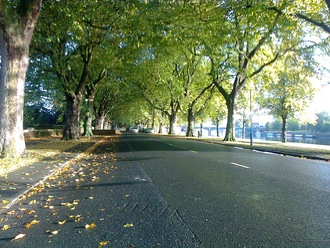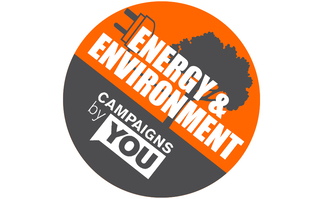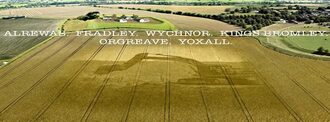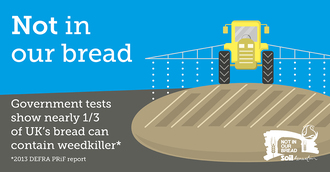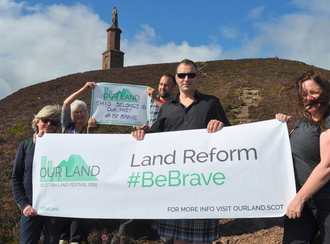-
Keep Victoria Embankment free from parking charges and orders.Victoria Embankment Nottingham is "not for profit land" has been given to the Citizens of Nottingham and the Locality (and visitors from further afield) for their mental and physical health & well-being, somewhere to escape all the pressures of life, including time and financial pressures. This Breathing Space should remain an oasis of unpressurised serenity. Despite some cars abusing the facility there is still plenty of space for Park Users to park up free and enjoy the simple Green Spaces. This highly protected Covenanted Land, all Gifted to the City, must be preserved from becoming another Income Generating Scheme.680 of 800 SignaturesCreated by Jonathan Hughes

-
No to new nuclear power stations in the UKSo we do not leave a legacy of more nuclear waste to our future generations75 of 100 SignaturesCreated by Kerrin Doyle
-
No Gas Works East LothianA large agricultural anaerobic digestion plant is planned in East Lothian, between Longniddry and Ballencrieff on the B1377. The plant will convert energy crops and agricultural by products into gas which will be fed into the national grid. It will be the largest agricultural (non-food) in Scotland and one of the largest in the UK, three times the size of the current largest agricultural plant. We believe the plant will have a detrimental effect on the local environment, and pose serious risks to wildlife. Other issues such as increased HGV traffic, noise, and odour will also be of concern to local residents and commuters along this road alike. The site sits in an area of outstanding natural beauty, with the size, and especially height of the development far in excess of any other nearby structures. It will also sit less than 400m from residential property. The proposals are not yet on the online planning portal, but we expect them to be very soon. There will be a short window where objections can be lodged against the proposal and we will provide more details as they become available.764 of 800 SignaturesCreated by No Gas East Lothian

-
Cut down on useless Packaging in Supermarkets (CPS)Lets cut down on what goes into land fill, less to go into transporting of rubbish and better for environment.7 of 100 SignaturesCreated by Adrian Doward
-
Solar panel import surchargeAn import surcharge was imposed on solar panels some years ago, ostensibly to protect solar installation companies (presumably by trying to prevent people doing their own installations; the installation companies claimed this would damage their business (!)) The government is removing the subsidies provided for renewable energy installations. My belief is that if they're doing this then the surcharge on solar panel imports should also be removed. If the government is genuinely committed to the introduction of renewables then the import surcharge should be removed, especially as the government is drastically reducing subsidies on renewables. The surcharge was aimed primarily at Chinese imports... somewhat odd as the building of new nuclear power stations is now going to involve Chinese companies to a great extent.3 of 100 SignaturesCreated by Norman Ascough
-
Stop Quarrying ruining our villages!Quarrying here will ruin village life. Heavy quarry lorries will be passing close by Alrewas but through Fradley, Kings Bromley, Yoxall and hamlets in between, poor air quality is inevitable and quarrying will ruin the beautiful countryside and kill wildlife. Best and fertile soil for the successful farming and agricultural industry in the area will be lost for good. There is a national shortage of infill and replacing the soil will be impossible. Do we want yet more lakes and water facilities as a result? Do we want to lose our farming and agricultural industry and put farmers out of work? There are safety issues concerning the large, high pressure gas pipelines that run beneath the earmarked area. Mistakes could be fatal and a quarry here will pose a serious security risk. The explosion of just one pipe could cause fatalities in nearby villages. Imagine what 8 could do! How do we manage the flows of people in and out of the area to keep the gas pipe safe against a terrorist attack? This is a popular area for tourists. This is because of the wonderful country views and open countryside, listed, historic buildings such as Wychnor Golf and Country Club, the Millennium Way and other public country walks, the canal and Fradley Junction, and historic villages and buildings used and visited by tourists from around the globe. 3 quarries will surely degrade the area, all of the above will be impacted, removing the attraction for tourists and cutting off valuable tourist income to the local communities. This area has suffered greatly from quarrying. There are already a number of quarries in Barton Under Needwood, Alrewas, Elford that are operational and being extended. Together with HS2, 3 more quarries will be devastating for the area. How much more can one small area take? We know the gravel has to be supplied from somewhere but there are other, more suitable areas that SCC should consider that will not impact villages, are not in areas already suffering from many years of quarrying and do not pose a safety and security risk. We would also argue that the UK does not recycle aggregate materials as much as it could and in comparison to other European countries our efforts are poor. If recycling was done properly and well, so many quarries would not be needed. Please help us stop the constant degradation of our environment and countryside. Make our government and local Council think about the impact on people, safety and local business. Please sign and stop quarrying in this area!339 of 400 SignaturesCreated by Jayne Geldard
-
Petition DECC to urgently review the current approach to the solar feed in tariffJobs at risk The cost of solar panels since 2007 has fallen by over 70%. It is now the cheapest of all renewable technologies. This week, India announced the creation of 50 solar cities. Solar around the world is booming. In a few years, it won't need any support at all. But the UK Government seems to want to do everything it can to kill solar before we get to that point – and risk tens of thousands of jobs in the process. This is not the first time the Government has tried to kill the feed-in tariff, the scheme that pays people to feed clean electricity into the national grid from their solar panels. Back in 2011 Government tried to kill off 90% of the scheme with retrospective cuts. Friends of the Earth, together with the solar industry, took the Government to court - and won. Ministers were forced to backtrack. But once more, 35,000 jobs in the solar industry are on the line. (Quote from Friends of the Earth and image credit to intel free press)163 of 200 SignaturesCreated by Mark Ferguson
-
Weedkiller: Not in our BreadGlyphosate is the most widely sold weedkiller in the world; you might know it as the active ingredient in Roundup. Government figures show its use in UK farming has increased by 400% in the last 20 years. Many farmers routinely use glyphosate and other herbicides to clear their fields of weeds before crops emerge in the spring. On the advice of the big chemical companies like Monsanto, farmers also use herbicides on crops shortly before they are harvested, in order to dry out the plants and make them easier to harvest. Tests by the Defra committee on Pesticide Residues in Food have found up to 30% of Britain's bread contained glyphosate. Recently, the International Agency for Research on Cancer (IARC), part of the World Health Organisation, identified glyphosate as a ‘probable carcinogen’ to humans. The safety regulators in the UK and EU only look at glyphosate on its own. But in the real world, glyphosate is always mixed with other chemicals to make sure the glyphosate sticks to, and penetrates the plants it’s sprayed on. Many of these other chemicals are toxic. According to recent research, some of these mixtures can be up to 1,000 times more toxic than glyphosate alone. A recent European study found 7 out of 10 people had traces of the weedkiller in their urine. Glyphosate has also been found in the breast milk of German women. We now know that glyphosate has potentially significant health implications for all of us. There is no excuse for glyphosate use. Please sign our petition and keep weedkiller out of our bread.1,015 of 2,000 SignaturesCreated by Ruth Semple
-
Fracking: KCC must consult the people of KentKCC’s Proposed modifications to the Kent Minerals and Waste Local Plan (MWLP) 2013-30. state that subject to certain conditions, planning permission will be granted for proposals associated with the exploration, appraisal and development of oil, gas and unconventional hydrocarbons. This blanket approach ignores the inherent risks of fracking which have been well documented around the world. The dangers are real and critical. Consultation on the subject has been buried in obscurely worded documents that will have successfully slipped below the radar of most of the residents of Kent. This is not an acceptable democratic approach. KCC must ensure they represent the views of the residents and land-owners of Kent before permitting any fracking activity to take place on Kentish soil.318 of 400 SignaturesCreated by Sue Rule
-
Consult on 4th option for East of Bath Park and RideThe Conservatives running B&NES have ignored the strong objections of local people and put forward three terrible sites for a Park & Ride, all of them on the beautiful meadows. The options would all wreck the views enjoyed by residents and visitors and ruin our recreational use of the valley. The size of the sites are all too small and on their own won’t do much about the horrendous jams on London Road.473 of 500 SignaturesCreated by Lisa Brett
-
Stop deforestation for Palm Oil300 football pitches an hour of forest are being lost to Palm Oil producers. It's in half of the products in the supermarkets and no one is doing anything to stop it or make the big companies accountable. Orangutans amongst the other forest dwelling animals are losing their homes and lives.63 of 100 SignaturesCreated by catherine taylor
-
MSPs: Don't Back Down on Land Reform!Scotland has the most concentrated land ownership in the developed world. Just 432 people own half of the private land. Land prices are far too high - this is why rents are extortionate, and why young people are leaving when they can't even get a scrap of land for housing. For Scotland to flourish and every community to have a say over their resources and their future, we need a strong land reform bill that really tackles all these issues. We're up against a wealthy landowning lobby who want to water down the Scottish government's proposals - so we must make our voice heard! Tell your MSPs to back the five demands of the #OurLand campaign and make sure we get a bill that can change Scotland for the better. The Our Land Campaign was set up by Common Weal, Women for Independence, the Scottish Land Action Movement and campaigners Andy Wightman and Lesley Riddoch to highlight the way unavailable and unaffordable land blights development in the countryside and cities.3,900 of 4,000 SignaturesCreated by Jen Stout
Hello! We use cookies to improve your experience by providing insights into how the site is being used. Find out more.
